Azerbaijan-UNESCO relations within the framework of commemoration of anniversaries of great personalities and events
As part of the USSR, Azerbaijan has taken an active part in the activities of UNESCO in the 60’s of the 20th century. In 1967, UNESCO released comedies by M.F. Akhundov in French in the “Literature of the peoples of the Caucasus” series, then two recording discs and two audio cassettes of Azerbaijani mugham in the “Music of the peoples of the 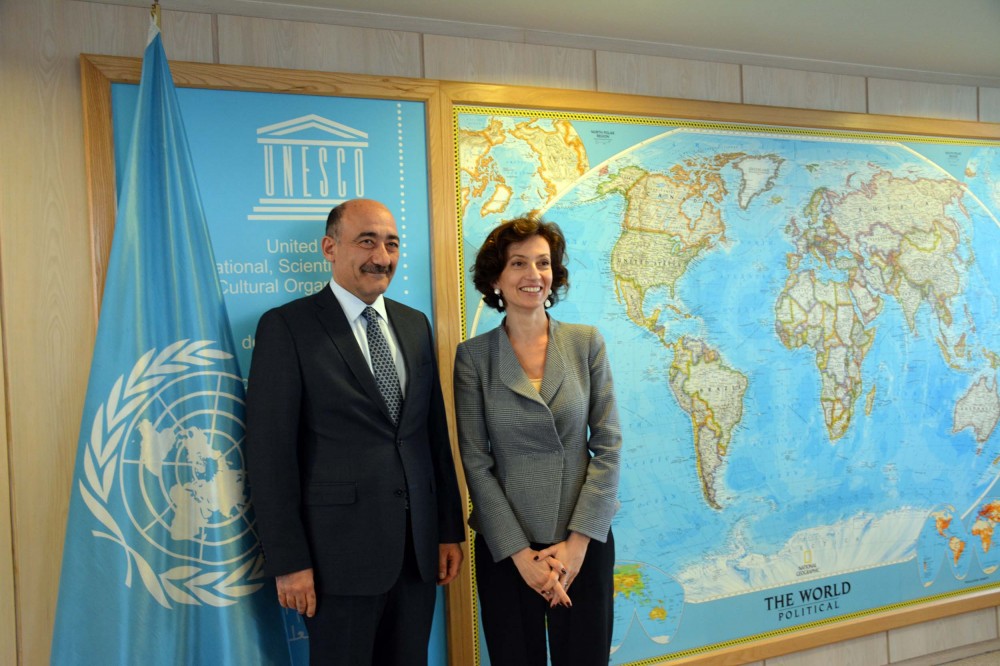 World” series.
World” series.
The National Leader of Azerbaijan Heydar Aliyev greatly contributed to the development of relations between Azerbaijan and UNESCO during the Soviet period. He actively participated in Azerbaijani cultural events arranged by UNESCO. In 1983, at the First International Symposium dedicated to the “Art of the Oriental Carpet”, he met with the Special Adviser to the Director-General of UNESCO Mr. Frederico Mayor. That meeting had a salutary effect on already friendly relations between Azerbaijan and UNESCO, and laid the foundation for successful cooperation between Azerbaijan and UNESCO when Azerbaijan reestablished its independence.
Exhibitions dedicated to “Azerbaijani carpets” (1981), “Azerbaijani manuscripts” (1985) held at UNESCO Headquarters in Paris, and that depicting “the Architecture of Baku” held later in London, were consecutively arranged under the auspices of UNESCO. In November 1984, the Azerbaijan State Dance Ensemble performed at UNESCO Headquarters.
UNESCO provided financial assistance to Azerbaijan in holding “A Language and a City” (1981), and “the Oriental Carpet Art” (1983), conferences. In 1983 the image of Memar Ajami Nakhchivani portrayed in a carpet by Azerbaijani painter and carpet-maker Latif Karimov was presented to UNESCO by the government of Azerbaijan during a visit of the Director-General of UNESCO Mr. Amadou-Mahtar M’Bow to Baku.
The Republic of Azerbaijan became member of UNESCO on 3 June 1992, after restoration of its independence. In December 1993, during his official visit to France, the President of the Republic of Azerbaijan Heydar Aliyev met with UNESCO Director-General Federico Mayor.
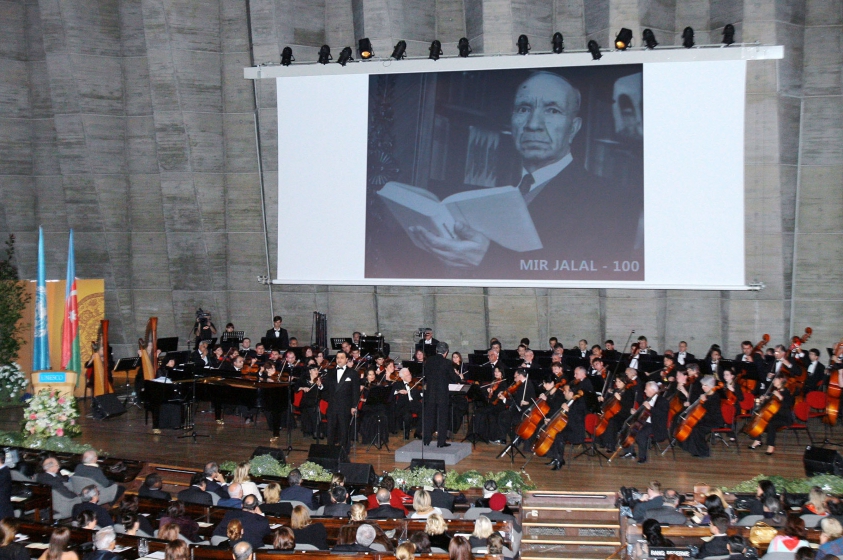 According to Article 7 of the Constitution of UNESCO, each Member State shall form a National Commission to represent link between educational, scientific and cultural institutions of Azerbaijan and UNESCO. Thus, all the necessary steps were taken in that direction and the National Commission of the Republic of Azerbaijan for UNESCO was established under the Ministry of Foreign Affairs by the Decree of the President of the Republic of Azerbaijan Heydar Aliyev on 21 February 1994,.By the President of the Republic of Azerbaijan Ilham Aliyev’s 1006 Decree of 15 September 2005, the phrase “The Ministry of Foreign Affairs of the Republic of Azerbaijan” was replaced by “the President of the Republic of Azerbaijan”, and the composition of the National Commission was determined.
According to Article 7 of the Constitution of UNESCO, each Member State shall form a National Commission to represent link between educational, scientific and cultural institutions of Azerbaijan and UNESCO. Thus, all the necessary steps were taken in that direction and the National Commission of the Republic of Azerbaijan for UNESCO was established under the Ministry of Foreign Affairs by the Decree of the President of the Republic of Azerbaijan Heydar Aliyev on 21 February 1994,.By the President of the Republic of Azerbaijan Ilham Aliyev’s 1006 Decree of 15 September 2005, the phrase “The Ministry of Foreign Affairs of the Republic of Azerbaijan” was replaced by “the President of the Republic of Azerbaijan”, and the composition of the National Commission was determined.
According to the President of the Republic of Azerbaijan Heydar Aliyev’s 20 April 1997 Decree on celebration of the 1300th anniversary of the “Book of Dede Korkut”, State Commission on the 1300 anniversary of the “Kitabi Dede Korkut” epos was established. On 21 February 1999, a Decree on the action plan of the State Commission on the 1300 anniversary of Dede Korkut was signed. On 9 April, 2000, festivities dedicated to the 1300 anniversary of “Kitabi Dede Korkut” were held with participation of the authorities of the Azerbaijan Republic, Kazakhstan, Kyrgyz Republic, the Republic of Turkey, and the Director-General of UNESCO K.Matsuura.
The First Vice President of the Republic of Azerbaijan, Goodwill Ambassador of UNESCO and ISESCO, President of Heydar Aliyev Foundation, Mehriban Aliyeva's activity, global projects for the development of science, education and culture established a new stage in relations with UNESCO. The President of the Heydar Aliyev Foundation Mehriban Aliyeva renders great services in the promotion of cultural heritage of Azerbaijan, ensures the protection of it on the national and regional levels. In order to promote the traditional classical music of Azerbaijan around the world Mrs. Mehriban Aliyeva initiated the establishment of the International Mugham Center in Baku.
On October 21, 2006, the President of the Heydar Aliyev Foundation, UNESCO Goodwill Ambassador Mrs. Mehriban Aliyeva participated at a fest dedicated to the 60th anniversary of UNESCO “Azerbaijan: at the crossroads of cultures and civilizations” organized in the framework of the week of “Dialogue among Civilizations”.
On May 20, 2008, in the framework of the annual meeting of the Goodwill Ambassadors, a concert “Goodwill Angels of Azerbaijan” was given under the auspices of the Heydar Aliyev Foundation at the headquarters of UNESCO.
On 17 November, 2009, in the framework of Days of Azerbaijan in UNESCO, Conference titled “Women of Azerbaijan: yesterday, today, tomorrow” was held in UNESCO headquarters.
On December 14, 2010, the President of the Heydar Aliyev Foundation, UNESCO Goodwill Ambassador Mrs. Mehriban Aliyeva attended the event dedicated to the 65th anniversary of UNESCO at its Headquarters.
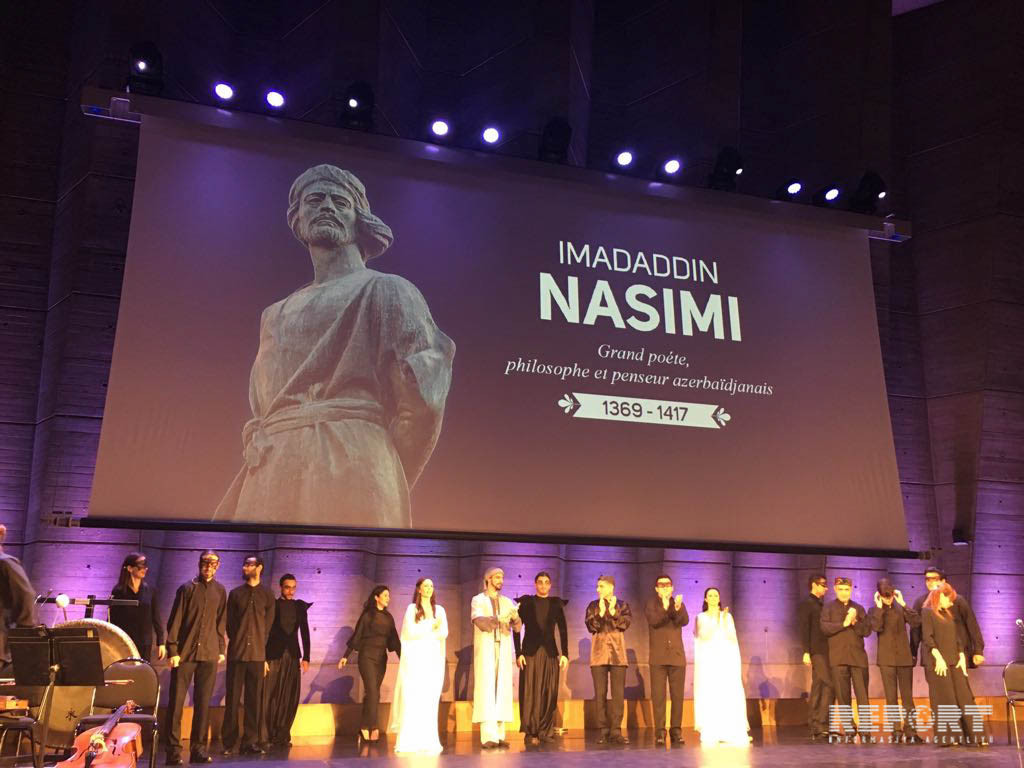 On April 19, 2011, on the occasion of the 20th anniversary of Azerbaijan’s independence, a gala performance entitled “Young Talents of Azerbaijan” was organized at UNESCO headquarters. UNESCO Goodwill Ambassador, the President of the Heydar Aliyev Foundation Mrs. Mehriban Aliyeva and UNESCO Director-General Irina Bokova attended the concert. Following the event a reception was given by Mehriban Aliyeva. At the same time, on 19-29 April, 2011, an exhibition of Azerbaijani carpets was showcased at UNESCO headquarters. UNESCO Goodwill Ambassador Mehriban Aliyeva and UNESCO Director-General Irina Bokova attended the opening ceremony of the exhibition.
On April 19, 2011, on the occasion of the 20th anniversary of Azerbaijan’s independence, a gala performance entitled “Young Talents of Azerbaijan” was organized at UNESCO headquarters. UNESCO Goodwill Ambassador, the President of the Heydar Aliyev Foundation Mrs. Mehriban Aliyeva and UNESCO Director-General Irina Bokova attended the concert. Following the event a reception was given by Mehriban Aliyeva. At the same time, on 19-29 April, 2011, an exhibition of Azerbaijani carpets was showcased at UNESCO headquarters. UNESCO Goodwill Ambassador Mehriban Aliyeva and UNESCO Director-General Irina Bokova attended the opening ceremony of the exhibition.
On October 26, 2011, UNESCO Goodwill Ambassador Mehriban Aliyeva participated at the “How does UNESCO contribute to building a culture of peace and to sustainable development?” Forum of Leaders held in the frames of the 36th session of the General Conference. In her speech, Mrs. Mehriban Aliyeva spoke about financial crisis and discrimination based on race, ethnicity and religion, and its harmful effect on tens of millions of people around the world. She also pointed out the fact that the new world order wasstill to be built and that this process would go through challenges before finding its end to final solution. She highlighted the importance of the humanitarian aspect of globalization and possibility of overcoming all obstacles through open dialogue and good will.
On July 18, 2013, Mehriban Aliyeva participated at an event held at UNESCO headquarters on the occasion of the 20th anniversary of Azerbaijan’s accession to the Organization. On the same occasion, the Government of Azerbaijan organized an exhibition of stone monuments in UNESCO’s garden. UNESCO Goodwill Ambassador Mrs. Mehriban Aliyeva and UNESCO Director-General Irina Bokova attended the opening ceremony of the exhibition. Participants of the event were presented with books on stone art history of Azerbaijan.
On 18 July 2013, the Director-General of UNESCO, Ms Irina Bokova and the Minister for Culture and Tourism of the Republic of Azerbaijan, Mr Abulfas Qarayev, signed a Framework Agreement on Cooperation in the fields of education, science, culture and communication between UNESCO and the Republic of Azerbaijan. The objective of the Framework Agreement is to strengthen, promote, develop and enhance cooperation in the aforementioned fields on the basis of equality and mutual benefit. It was agreed to establish the Azerbaijan/UNESCO Trust Fund (US $5 Million ) enabling the Government to make its financial contributions in support of UNESCO projects and, at the same time, to provide permanent jobs for Azerbaijani experts in order to protect interests of Azerbaijan in the organization.
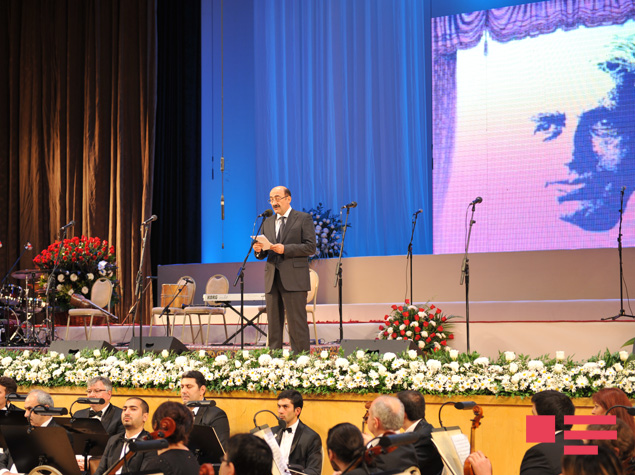 On 24 January, 2014, Agreement on the establishment of the UNESCO Junior Professional Programme (JPO) between the Government of the Republic of Azerbaijan and UNESCO was signed by the Minister of Foreign Affairs Mr. Elmar Mammadyarov and UNESCO Director-General Ms. Irina Bokova. In accordance with the agreement, two young specialists from Azerbaijan were offered jobs within the Organization. This agreement expands bilateral cooperation, strengthens the position of Azerbaijan in the Organization, and allows more active participation in the decision-making.
On 24 January, 2014, Agreement on the establishment of the UNESCO Junior Professional Programme (JPO) between the Government of the Republic of Azerbaijan and UNESCO was signed by the Minister of Foreign Affairs Mr. Elmar Mammadyarov and UNESCO Director-General Ms. Irina Bokova. In accordance with the agreement, two young specialists from Azerbaijan were offered jobs within the Organization. This agreement expands bilateral cooperation, strengthens the position of Azerbaijan in the Organization, and allows more active participation in the decision-making.
On June 2, 2014, a week of Azerbaijani cuisine dedicated to “Traditional Dishes Preserved for Centuries”, was held under auspices of the Heydar Aliyev Foundation at UNESCO headquarters.
From 15 to 18 September, 2014, a “Gobustan Week” fest was held by the Heydar Aliyev Foundation, the Ministry of Culture and Tourism of the Republic of Azerbaijan and the Permanent Delegation of the Republic of Azerbaijan to UNESCOat UNESCO headquarters. The “Shadows of Gobustan” ballet by Faraj Garayev and the inauguration of Gobustan petroglyphs were successfully held at UNESCO as well.
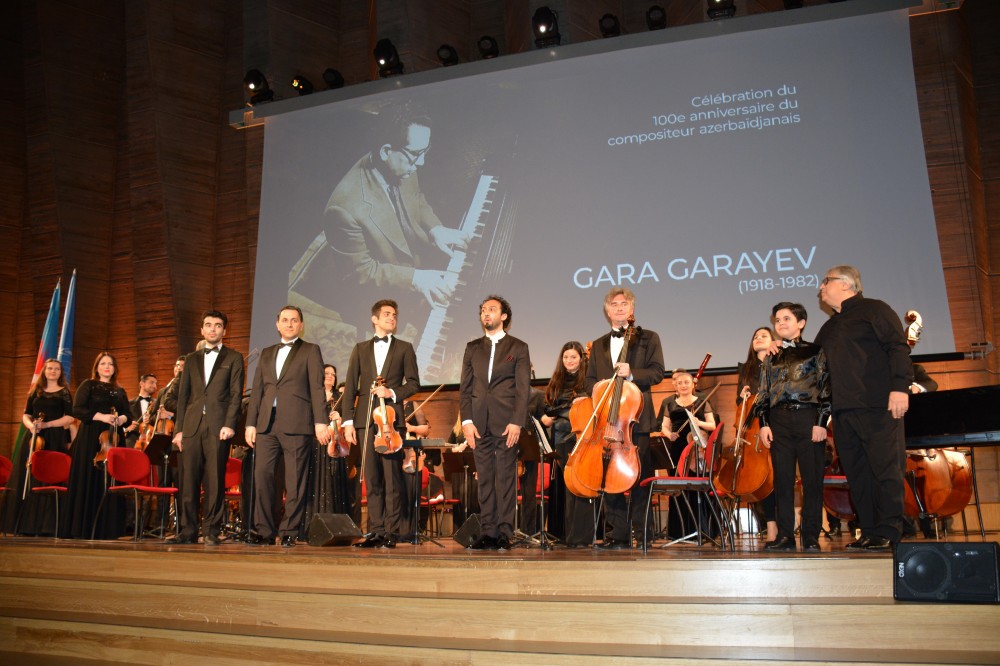 From 6 to 13 May, 2015, a series of events related to Azerbaijani Culture were held at UNESCO Headquarters with the support of the Heydar Aliyev Foundation, namely an exhibition dedicated to Azerbaijani national chovgan game, which was included to the List of Intangible Cultural Heritage in Need of Urgent Safeguarding; the presentation of a book called “Karabakh Horses”, written by Jean-Louis Gouraud, a French writer and historian; anexhibition “Azerbaijan: From Tradition to Modernity” and, finally, a concert of the “New Jazz Generation” group.
From 6 to 13 May, 2015, a series of events related to Azerbaijani Culture were held at UNESCO Headquarters with the support of the Heydar Aliyev Foundation, namely an exhibition dedicated to Azerbaijani national chovgan game, which was included to the List of Intangible Cultural Heritage in Need of Urgent Safeguarding; the presentation of a book called “Karabakh Horses”, written by Jean-Louis Gouraud, a French writer and historian; anexhibition “Azerbaijan: From Tradition to Modernity” and, finally, a concert of the “New Jazz Generation” group.
1995: 500th anniversary of the birth of the poet Muhammad Fuzuli
A major figure of the classical school of Turkic literature, Fuzuli was a very prolific author. His poetry was written in the Azeri, Arabic and Persian languages. Fuzuli’s fame extends over a large geocultural area, including the Islamic world where his famous love story of Leyla and Mecnun is very popular.
1998: 1300th anniversary of the epic Azerbaijani legend Kitab-i Dede Qorqud
A collection of a number of tales in prose, interspersed with verse passages, the oldest surviving specimen of the Oghuz epic, and one of the most remarkable literary monuments for Azerbaijan proclaiming the universal values of tolerance, and humanism. They are named after the sage, a legendary character who appears in each tale, and refers to the poet-magicians of the shamanistic era covering Azerbaijan, Anatolia and Turkestan. Many scholars worldwide have been occupied with elucidating the historical, literary, linguistic, ethnological, and folklorist aspects that surrounds Kitab-i Dede Qorqud. It is considered as a masterpiece of the Oghuz tribes, and the Turkic speaking peoples, in a pre-Islamic age - between the fifth and seventh centuries.
2001: 800th anniversary of the birth of Nasir ad-Din Tusi
The renowned astronomer, mathematician and philosopher (1201-1272) predicted the position of the Sun, the Moon and various planets. He made a significant contribution to trigonometry and spherical geometry and was active in other areas of science, medicine, ethics and law.
2002: 200th anniversary of the birth of Mirza Kazim-Bey
Mirza Kazim-Bey (1802-1870) was a famous orientalist, historian and philologist of Azeri origin. The work done by Mirza Kazim-Bey is of worldwide importance, for he was one of the founders of Oriental studies in Russia. As Director of the Faculty of Oriental Studies of the University of Kazan and founder and first Dean of the Faculty of Oriental Studies of the University of Saint Petersburg, he trained such renowned Orientalists as K. Foygt, I. Berezin, N. Ivanov, O. Kovalevsky, D. Mitchell, V. Dittel and A. Popov. Mirza Kazim-Bey was elected a member of the Paris-based Société Asiatique (1850), the American Oriental Society (1851) and the American Philosophical Society (1862).
2005: 100th anniversary of the birth of Yusif Mammedaliyev (1905-1961)
Yusif Mammedaliyev (1905-1961) was an eminent Azerbaijani scientist who contributed to the development of international research in the field of chemistry. Thus, he is the originator of a method, unique all over the world, of hydrocarbon halogenation, which made possible the industrial production of many synthetic materials. He also elaborated and produced a new process of obtaining a very high quality aviation fuel. One of the founders and presidents of the Academy of Science of Azerbaijan, this scientist also undertook an important activity in the field of education and played a considerable role in the public life of his country.
2006: 100th anniversary of the birth of Latif Kerimov, carpet designer and artist (1906-1991)
The development of ornamental and pictorial carpets in modern Azerbaijan is closely connected with the name of the great carpet designer and people’s artist Latif Husein Kerimov. Scientific chronicler, historian of Azerbaijani carpet art, carpet designer and artist, Kerimov was also a connoisseur of Azerbaijani and Eastern literature and a virtuoso of the naskh and nastaliq styles. Using his profound knowledge of traditional ornamental art, he created new decorative motifs. Kerimov founded the State Museum of Azerbaijani Carpet and Applied Arts, which opened in Baku in 1967. He was also involved in organizing two international UNESCO sponsored symposiums, “Oriental Carpet Art” and “Azerbaijani Carpet Art”, held respectively in 1983 and 1988 in Baku. Kerimov’s unique works were exhibited in many countries. He carried out extensive research in the field of applied decorative arts. His creations and his erudition both contributed to the diffusion of Azerbaijani culture, and he was one of the most celebrated intellectuals in the East.
2008: 100th anniversary of the first opera in the East: “Leyli and Majnun”
The opera "Leyli and Majnun" was premiered in the Taghiyev Theater in Baku on 12 January 1908. The work became identified as the "First Opera of the Muslim East". The plot, based on an immortal love story, can best be compared to "Romeo and Juliet", though in the oral tradition the legend of "Leyli and Majnun" predates Shakespeare by more than a thousand years. Uzeyir Hajibeyov (1885-1948) was the composer of this opera. He was 22 at the time of its premiere. He and his younger brother, Jeyhun (1891-1962), wrote the libretto based on the poetic rendition of "Leyli and Majnun" by the Azerbaijani poet Fuzuli (1480-1562). Many of the verses were kept in their original form. The "Leyli and Majnun" opera is based on traditional Azerbaijani mughams, which are performed in their original form. Entire segments of the opera feature specific mughams, depending on the emotional effect the composer was trying to convey. The mughams called Mahur-Hindi, Segah, Chahargah, Kurd-Shahnaz, Bayati-Shiraz, Shushtar, Bayati-Kurd, Shabi-Hijran and Gatar are among those featured in this opera.
2008: 100th anniversary of Musa Aliyev, geologist (1908-1985)
Musa Aliyev was a prominent scientist in the field of geology, palaeontology and
biochemistry and his works contributed to the development of the world's science. His works were published in Azerbaijan, but also in Mexico, Egypt and Lebanon.
2008: 100th anniversary of the birth of Mir Jalal Pashayev, writer (1908-1978)
Mir Jalal Pashayev (1908-1978) is recognized as both writer and literary critic. He was one of Azerbaijan's most gifted short story writers when it came to satirizing Soviet bureaucracy. A professor of literature at Baku State University, he wrote hundreds of short stories during his spare time. Seventy of his books are in print. Some have been translated into French, Czech, Persian, German and English. He also co-authored the three-volume, History of Azerbaijani Literature (1957-1960). His most wellknown books include: Resurrection Man (Dirilan Adam, 1936), Manifest of a Young Man (Bir Ganjin Manifesti, 1938), Where Are We Going? (Yolumuz Hayanadir, 1957) and People of the Same Age (Yashidlar, 1984).
2009: 100th anniversary of the birth of Sattar Bahlulzade, artist (1909-1974)
Sattar Bahlulzade (1909 - 1974) is the founder of modern Azerbaijani landscape painting. He began his professional education at the National Art Institute in Baku (1927-1931). In 1933, he studied in the Drawing Department at the Moscow Fine Arts Institute. He developed his own impressionist style to express his emotional feeling. Bahlulzade described his own works as paintings of big lyrical landscapes and pictures with the singing of the nature of his native country. His major talent was landscape painting. He loved to travel around his country – Azerbaijan – exploring its beauty, which was the source of his inspiration. Many of his works depict specific areas of Azerbaijan. Sattar Bahlulzade won many prizes. He received the title of Honoured Art Worker of the Republic of Azerbaijan in 1960 and was named People’s Artist in 1963. His works have been exhibited all over the world, including personal exhibitions in the United States of America, United Kingdom, Turkey and Russia. He also created around 30 sketch diaries that contain his reflections on life and art.
2013: 100th anniversary of the musical comedy Arshin Mal Alan of Uzeyir Hajibeyli (1913)
Arshin Mal Alan is the third and last musical comedy of the great Azerbaijan composer Uzeyir Hajibeyov, founder of the national composers’ school, and author of the first eastern opera. He completed his work Arshin Mal Alan, which is close to the comic opera genre, in the summer of 1913, in St. Petersburg. Its depth of images and development level makes it a major and innovative musical and scenic form.
2013: 900th anniversary of achievements of Mahsati Ganjavi, poetess (12th century)
Mahsati Ganjavi was a 12th century poet, born in Ganja, Azerbaijan. She received an education closely acquainted with Eastern literature and music.
Mahsati Ganjavi was a famous rubai writer recognized not only in her epoch but much later also. Her most productive period of creation was spent in the palace of Sultan Mahmud Seldjuk and that of his uncle Sanjar Seldjuk. Mahsati Ganjavi commonly wrote rubai in Persian. The love plot holds the main place in her creations. The rubais are marked out by their worldliness, humanism, epicurism and optimism. Mahsati Ganjavi describes love as a fragile natural feeling which makes a man's fame higher. The poetess protested against religious prejudices, hypocrisy, conservatism and protected a man’s moral freedom. Her poems reflected the people, especially women’s, romantic dreams of a free and happy life.
2013: 550th anniversary of the death of Seyid Yahya Bakuvi (Shirvani), philosopher and poet (ca. 1390s-1463)
Founder of the Khalvatiyyah order, which was an important Sufi movement known for its strict ritual training of its dervishes and its emphasis on individual asceticism and retreat. This philosopher disseminated his movement worldwide. Today, his Mausoleum is very famous in the Old City of Baku (Icherisheher), which is now a World Heritage Site.
2014: 1100th anniversary of the death of Ahmad AI-Bardiji, philosopher and scholar (834-914)
The work of Ahmad Al-Bardiji related to religious tradition and dialogue and contributed to Islamic historiography, law and ethics. Highlighting the historiography of Islam and promoting universal ethical principles should serve to strengthening the mutual understanding between different religions. UNESCO’s association with this anniversary is in line with one of its main missions – promoting intercultural dialogue and safeguarding diversity of cultural expressions.
2014: 100th anniversary of the birth of Ilyas Afandiyev, writer and playwright (1914-1996)
As the author of more than 80 works, including plays, novels, short stories and essays Ilyas Afandiyev was well known in foreign audience. His works show the realities of life, social issues, family issues, intergenerational relationships, as well as the way out of the situation and problems. The heritage of Ilyas Afandiyev is still alive and studied in many institutions and research centers. This proposal is an example of outstanding life of a writer and poet who contributed to the promotion of principles of cultural diversity, tolerance and respect between people.
2015: 200th anniversary of the German translation of Kitabi Dede Qorqud and its publication (co-organized with the national commissions for UNESCO and permanent missions of Azerbaijan, Turkey, Kazakhstan and Turkmenistan, and with the support of the International Turkic Academy).
2017: 200th anniversary of German settlements in the South Caucasus Region (Migration of the Schwab Germans to Azerbaijan and Georgia)
Beyond the celebration of German settlers in Azerbaijan and Georgia, this anniversary outlines a relevant aspect of the encounter among peoples from different cultural and religious backgrounds and the interaction that emerged, that will be celebrated with commemoration events in Azerbaijan, Georgia and in Germany. In the context of globalized and increasingly diverse societies with growing challenges to peaceful coexistence, this celebration carries a strong message of openness to the other, of tolerance and respect of diversity and difference. It will particularly contribute to promoting intercultural and interreligious dialogue for better mutual understanding and peace, echoing in this regard the objectives of the International Decade for the Rapprochement of Cultures (2013-2022), for which UNESCO is the lead United Nations agency.
2017: 300th anniversary of the birth of Molla Panah Vagif, poet (1717-1797)
Molla Panah Vagif is one of the most outstanding Azerbaijani lyrical poets whose legacy has not just opened a new strand in the development of the national literature, but even organically “implanted” into folk poetry of ashyqs (minstrels), having inspired dozens of dedications and allusions through the generations of folk poets. Vagif, as a founder of the realism genre in Azerbaijani poetry, has written a great number of poems that have had wide circulation among people. His poetry has become a definite step in Azerbaijani literature discovering the new expressiveness. It has had an impact on processes during that period in Safavi (and later on – Qajar) Persian or Ottoman Turkish and other literatures of the region. After nearly three centuries, Vagif’s poetry is still widely appreciated, cited and recited. Vagif through his poetry promoted freedom, love, peace, respect of moral and ethical values, and mutual understanding – the principles that UNESCO stands for and advances.
The proposal highlights Vagif’s merit in bringing the poetry “from the caste of literary connoisseurs to the wider circles of the ordinary people”. The celebration of Vagif’s anniversary will acknowledge this significant cultural move from the past of one given literary tradition, promoting UNESCO’s adherence to the principles of diversity of cultural expressions. Commemoration of Vagif’s legacy will reflect UNESCO's overarching objectives – fostering cultural diversity, intercultural dialogue and a culture of peace, as well as contribute to its strategic activities in protecting, promoting and transmitting heritage.
2017: 600th anniversary of the death of Nasimi (Sayyid ‘Imād-ad-Dīn), poet (1369-1417)
Nazimi (Imad-ad-Din) was born in Shamakha, Shirvan khanate (part of modern-day Republic of Azerbaijan). The great poet has left vast and precious poetic legacy in Azerbaijani, Persian and Arabic languages. His poetry has made a significant impact on the development of Azerbaijani as well as Ottoman Turkish poetic languages over the centuries. The ideas of free spiritual choice and principle of universal love guided the poet towards tolerance, looking above the boundaries, seeking the image of God hidden in every single human being. In this sense his perseverance, moral fortitude, along with intricate interplay of crystal clear language and most abstract and hermetic metaphors has made this personality one of the prominent figures in the Islamic poetry and worldwide literature. Nasimi’s death stands for many centuries for a symbol of suffering for the humanistic ideals.
Considering that Nasimi’s life and poetry had a significant impact on development of whole set of humanistic values in the region, the commemoration events will contribute to UNESCO's mission on promotion of mutual understanding, tolerance and culture of peace.
Reference and hyperlink required.
